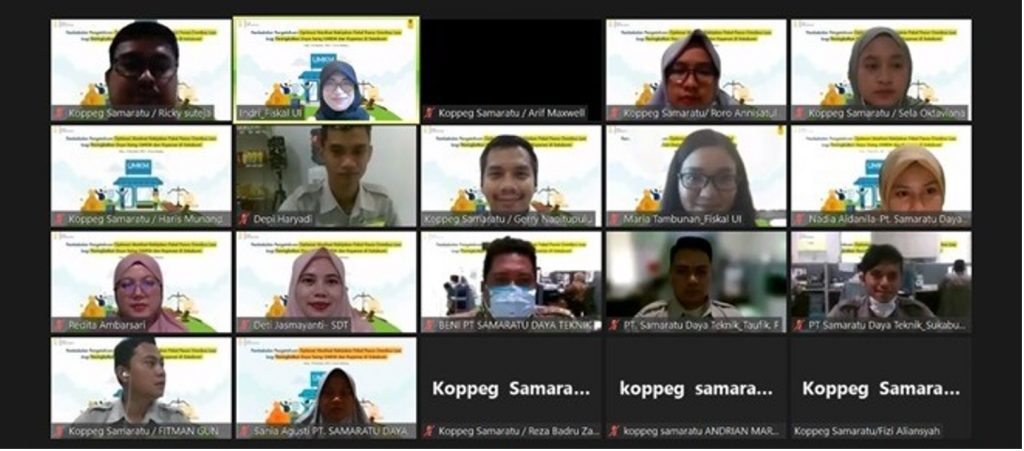
There are at least three factors that influence the underdevelopment of MSMEs in Indonesia. First, internal weaknesses related to management capacity. Second, there is a lack of infrastructure that bridges MSMEs and cooperatives with sources of capital, training, technology and management. Third, the explorative pattern of relationships in the MSME upstream-downstream chain.
To support the development of cooperatives and MSMEs and cooperatives in Indonesia due to these three factors, the service team from the Department of Fiscal Administration, University of Indonesia (UI) is encouraged to share knowledge about optimizing the benefits of fiscal policy after the Job Creation Law and Harmonization of Tax Regulations for Improving MSME Competitiveness. and Cooperatives through online media for the Samaratu Cooperative and its business groups in Sukabumi on Wednesday (8/12).
On that occasion, there were 20 people from cooperatives and five people from MSMEs who were representatives of the management of Cooperatives and MSMEs. They are administrators of Samaratu cooperatives and MSME business actors in the field of retail sales and service provision.
“We are delighted with the positive response from businesses. Hopefully, their business activities will continue to grow amidst the challenges of the ongoing Covid-19 pandemic. Hopefully what we share is useful for cooperatives and MSMEs. We also hope that MSMEs and cooperatives can optimize the use of tax incentives offered by the government and hopefully these incentives will help the cashflow of business entities. We also see the efforts made by Cooperatives and MSMEs to comply with tax provisions. Hopefully the decision to remain compliant will be maintained for the future,” said the head of service, Dr. Maria R.U.D. Tambunan.
The community service team consisted of Dr. Maria and Indriani, S.E., M.A., and Indriani, S.E., MA, assisted by technical team Annisa Parastry, S.I.P. They provided knowledge related to tax facilities that can be utilized by cooperatives and MSMEs. As is known, since Law No. 11 of 2020 on Job Creation was enacted, this provision has become one of the government’s efforts to improve the ease of doing business. To optimize the benefits of the issuance of the law, it is necessary to explore the facilities and benefits offered by the law for micro, small and medium enterprises and cooperatives.
Various kinds of facilities are provided by the Job Creation Law, including for MSMEs as stipulated in Government Regulation No. 7 of 2021 (PP No. 7/2021) concerning Ease, Protection and Empowerment of Cooperatives and MSMEs. It contains various fiscal facilities that can be used by cooperative and MSME businesses. In addition, there are changes related to tax obligations that are expected to reduce the tax burden borne by businesses. In general, the tax obligations of business actors-especially cooperatives and MSMEs-will be part of the business expense component.
The cooperative, represented by Gerry Mathew Napitupulu, expressed appreciation for the event. “We hope that such events can be held more massively and routinely so as to increase public knowledge regarding the fulfillment of tax obligations,” he said.
The community service team of the UI Department of Fiscal Administration outlined the main changes in tax laws before and after the issuance of the Job Creation Law and the Tax Regulation Harmonization Law. In addition, it explains the implications for tax obligations, as well as facilities that can be optimized later that are expected to increase the productivity and competitiveness of cooperatives.



